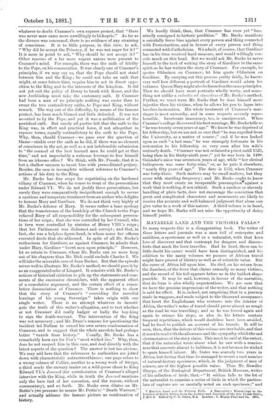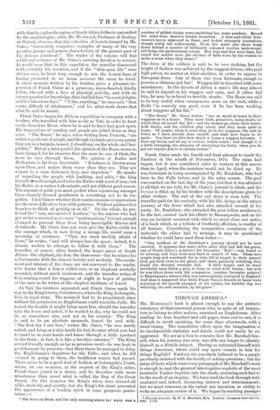MATABELE LAND AND THE VICTORIA FALLS.* IN many respects this
is a disappointing book. The writer of these letters and journals was a man full of enterprise and ambition, a sportsman as well as a naturalist, with that keen love of discovery and that contempt for dangers and discom- forts that mark the born traveller. Had he lived, there can be little doubt his career would have been distinguished, and his addition to the many volumes we possess a African travel might have proved of literary as well as of scientific value. But the curse of Africa fell upon him. He died, on his return from the Zambesi, of the fever that claims annually so many victims, and the record of his toil appears before us in the baldest shape possible. It may be said, however, in favour of the narrative, that its form is also wholly unpretentious. We are sure that we have the genuine impressions of the writer, and that nothing is said for effect. It is, indeed, not surprising that in a journey made in waggons, and made subject to the thousand annoyances that beset the Englishman who ventures into the interior of Africa, the writer's notes of travel should prove almost as rough as the road he was travelling ; and as he was forced again ana again to retrace his steps, so also do his letters contain frequent repetitions, which would doubtless have been avoided, had he lived to publish an account of his travels. It will be seen, then, that the defects of this volume are inevitable, and that it must be read with the allowance and the sympathy which the sad circumstances of the story claim. This must be said at the outset, that if the naturalist wrote about what he saw with a concise- ness that amounts almost to baldness, it is not because he wished to spare himself labour. Mr. Oates was scarcely two years in Africa, but during that time he managed to secure a vast number of natural-history specimens, which, in the judgment of men of science, are of the highest possible value. Thus Mr. Bawdier Sharpe, of the Zoological Department, British Museum, writes of his collection of birds, that,—" It seldom falls to the lot or the naturalist to examine a series of birds in which the particu- lars of capture are so carefully noted on each specimen ;" and • Matahele Land and the Victoria Palls. A 2ifaturalist's Wandering@ in the Interior of Sonth Africa, from the Letters and Journals of the late Frank ()atm'. F.E.G.S. Edited by C. G. Oates, B.A. London : C. Kogan Paul and Co. 1881.
adds that he explored a region of South Africa hitherto untouched by the ornithologist ; while Mr. Westwood, Professor of Zoology at Oxford, observes that the collection of insects formed by Mr. Oates, "fortunately comprises examples of many of the very peculiar groups and genera characteristic of the greater part of the African continent." The reader of the volume will find additional evidence of Mr. Oates's untiring devotion to science. It would seem that in this expedition the traveller discovered with certainty his vocation, and if the "thin-spun life" were slit too soon, he lived long enough to win the honest fame of having promoted in no mean measure the cause he loved. A short memoir, written by his brother, gives a pleasant im- pression of Frank Oates as a generous, warm-hearted, kindly fellow, blessed with a love of physical activity, and with an intense passion for knowledge, that enabled him "to scorn delights and live laborious days." "I like anything," he once said, "that seems difficult of attainment," and his after-work shows that -what he said be meant.
Frank Oates began his African expedition in company with a brother, who travelled with him as far as Tati, in order to hunt on the Semokwe River, where he is said to have had good sport. His impressions of country and people are jotted down as they arise. The Boers," he says, when writing from Pretoria, "are rather a good sort of people, and though trying to get every penny they can in a bargain, honest, I should say, on the whole, and hos- pitable." But at a later period, his opinion of the Boers seems to have changed, for he observes that the more he sees of them, the more he sees through them. His opinion of Kafirs and Hottentots is far from favourable. "Kindness is thrown away upon them, and makes them worse than they are. They are almost to a man dishonest, lazy, and impudent." He speaks of regarding the people with loathing, and adds, "the king himself it well enough, and rules the Kafirs with a rod of iron; but the Kafirs as a nation I abominate, and not without good reason. The amount of pride you must pocket when sojourning amongst these sCantily dressed gentlemen is something not to be for- gotten. I don't know whether their condescensions or oppressions are the more difficult to bear with patience. Without patience it is hopeless to think of getting on at all." On the whole, he pre- ferred the "raw, unconverted heathen," to the natives who had got so far converted as to wear "continuations," but not enough changed to prevent them from being incorrigible thieves and drunkards. Mr. Oates does not even give the Kafirs credit for the courage which, in men living a savage life, would seem a necessity of existence. "They are most terribly afraid of lions," he writes, "and will always lose the spoor ; indeed, it is almost useless to attempt to follow it with them." The traveller, of course, often hunted the larger game of South Africa—the elephant, the lion, the rhinoceros—but he relates his achievements with the utmost brevity and modesty. The excite- ment and interest of the chace are not conveyed to the reader, who learns that a lion is rolled over, or an elephant mortally wounded, without much excitement, and the traveller writes of lions roaring round his waggons at night in hopes of getting at the oxen as he writes of the simplest incidents of travel.
At Tati the brothers separated, and Frank Oates made his way to the King's town, Gubuleweyo, where the King, Lobengula, lives in royal state. The monarch had to be propitiated, since without his permission no Englishman could reach the Falls. He feared the trouble it might bring upon him, should the traveller take the fever, and asked, if he wanted to die, why he could not .clo so somewhere else, and not in his country. The King is said to be an absolute monarch, feared far and wide. " The first day I saw him," writes Mr. Oates, "he was nearly naked, and lying on a skin inside his hut, to enter which you had to crawl in on your hands and knees through a little aperture in the front ; in fact, it is like a bee-hive entrance." The King proved friendly enough, as far as promises went—he was kept in good-humour by presents—but three times be managed to delay the Englishman's departure for the Falls ; and when he did succeed in going to them, the healthiest season had passed. There seems to be a good deal of fashion at Lobengula's Court, where, on one occasion, at the request of the King's sister, Frank Oates joined in a dance, and he describes with more minuteness than usual what is called the Day of the Great Dance. On this occasion the King's wives were dressed all alike, modestly and quietly, but the King's fat sister presented the appearance of a leading spirit in some gorgeous panto- mime : — " She wore no dress, and the only covering above her waist was a number of gilded chains, some encircling her, some pendent. Round her arms were massive brazen bracelets. A blue-and-white free- mason's apron appeared in front, and looked strangely anomalous, though really not unbecoming. From her waist also there hung down behind a number of brilliantly coloured woollen neck-wraps, red being the predominant colour. Her legs and feet were bare, but round her ankles were the circlets of bells worn by the women to make a noise when they dance."
The dress of the soldiers is said to be very striking, but the height of fashion was achieved by the waggon-drivers, who paid high prices, no matter at what sacrifice, in order to appear in European dress. One of them was even fortunate enough to possess a chimney-pot hat ! Waggon life is described with some minuteness. In the deserts of Africa a man's life may almost be said to depend on his waggon and oxen, and if either fail him, he may be reduced to terrible straits. The Boers are said to be very useful when emergencies arise on the trek, while a Kafir "is scarcely any good, even if he has been working about waggons all his life."
"The Boers," Mr. Oates writes, "are as much at home in their waggons as in a house. They have little, primitive, camp-stools, on which they sit round the fire; and the women go about their house- hold duties, and the children play about, and they seem quite at home. Of course, when it rains they sit in the waggons, like rats in holes, as I have already done myself, and shall now begin to do again. You have no idea how much a home a waggon becomes. I have my books and all my et cfeteras within reach ; and though it is a little cramping, the pleasure of stretching the limbs when you do get out repays you to a certain extent."
Frank Oates made his fourth and final attempt to reach the Zambesi in the month of November, 1874. The rains had begun, but it was considered safer to venture at this season than in April, when the moisture would not be dried up. He was fortunate in being accompanied by Dr. Bradshaw, who had been to the Falls before, and in the rainy season. The goal was reached on the last day of the year, but that it was attained
is all that we are told, for Mr. Oates's journal is silent, and the lacuna is filled up by his brother with the descriptions given by other writers. The end of the sad story is soon told. The traveller paid for his curiosity with his life, dying on the return journey of the fever which had also attacked several of his party. Dr. Bradshaw, who attended the poor fellow assiduously to the last, carried back his effects to Bamangwato, and on the way an incident occurred with which we must close our notice of a book which, as a tribute of brotherly affection, is worthy of all honour. Considering the comparative scantiness of the
materials the editor had to arrange, it may be questioned whether he could have used them better :—
"One incident of Dr. Bradshaw's journey should not be here omitted. It appears that many miles after they had left the grave, one of Frank Oates's pointers—his favourite, Rail '—was found to be missing, and boys were sent back in search of him. These men sought long and wandered far in vain, till at length in their pursuit they got back even to the grave, and there, patiently watching, they found the devoted creature laid. A little longer, and he must inevitably have fallen a prey to lions or other wild beasts ; but now he was taken down with his companion [another favourite pointer] to Bamangwato, whence they were subsequently convffed to England. And thus it happened that while Frank Oates's friends at home were rejoicing at the speedy prospect of his return, his faithful dog was watching, the sole mourner, by his grave."



































 Previous page
Previous page